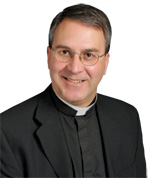 Q: With all of the news/media coverage of Bruce Jenner’s transformation into Caitlyn Jenner, and the new docu-series, “I am Cait,” what does the church teach about the concept of transgender?
Q: With all of the news/media coverage of Bruce Jenner’s transformation into Caitlyn Jenner, and the new docu-series, “I am Cait,” what does the church teach about the concept of transgender?
A: Despite what many people assume, the Catholic Church has not had an official teaching on the concept of transgender, mainly because for the majority of the time of the church’s existence, it was never even thought of as a possibility for someone to be transgender. Therefore, we look to the church to help us in our understanding and to give us guidance.
The Scriptures have proclaimed that at the beginning God made them male and female. Genesis 1:27 – “God created mankind in his image; in the image of God he created them; male and female he created them.”  Screenshots of Caitlyn Jenner’s Twitter page and website are shown above. Former Olympian Bruce Jenner discussed his transition to living as a woman in April.
Screenshots of Caitlyn Jenner’s Twitter page and website are shown above. Former Olympian Bruce Jenner discussed his transition to living as a woman in April.
God created each individual with their own personal identity. God created each person with their sexual identity. Now, the challenge some individuals are facing is the blurred vision of who they are when it comes to their sexual identity and discovering their place in the world.
Unfortunately, in our society when a problem arises too many people are trying to come up with a “quick fix.” Our culture has moved down a scary path when it places the right for individuals to make their own personal choice over natural law.
When someone expresses unhappiness with sexual identity, society now says, “Do something about it.” But wait a minute; quick fixes are not always the best fixes. Our human bodies are not simply machines on which we can simply go ahead and change parts.
Related ArticleVatican upholds bishop’s refusal to allow transsexual to be godparent |
As human beings, we consist of body, mind and soul, so a change to the body will have a dramatic effect on the mind and soul. As complex human beings, we must realize that any change that happens to our identity is going to have a major impact not only on our body, but on our mind and soul as well.
This, unfortunately, has played itself out in a real and dramatic way when it comes to the concept of transgender. One of the most alarming statistics related to transgender individuals is suicide attempts; there is a much higher rate of suicide attempts among transgender individuals. Some studies have stated that as many as 40 percent of transgender individuals try to kill themselves at some point in their lives.
These are serious issues and cannot be solved with quick fixes. While society may want to promote the quick fix, as people of faith we know that we must always look at the larger picture.
Q: What key points should we take from Pope Francis’ encyclical on the environment, “Laudato Si’, On Care for Our Common Home,” released June 18, and what should we start doing now?
A: Pope Francis has had a huge impact on the Catholic Church in particular and on the world as a whole. With his visit to the United States, he is having — and will have — an impact on Catholics here in the United States.
“Laudato Si’” is a beautifully written document on the environment. “Laudato Si’” means “Praise be to you,” which comes from the first line of a canticle by St. Francis of Assisi that praises God with all of his creation.
In the very beginning of the encyclical, Pope Francis states the goal of the document: “In this encyclical, I would like to enter into dialogue with all people about our common home” (3).
We all have a place we call home. When we travel for work or go on vacation and are away for an extended period of time, it is always nice to return to our home, to sleep in our own bed and relax in the comforts of our home.
Just as we each have our individual places we call home, we, as a common bond of humanity, share our common home, the Earth. In this encyclical, Pope Francis addresses his message to all people of the Earth.
He states, “I urgently appeal, then, for a new dialogue about how we are shaping the future of our planet. We need a conversation that includes everyone, since the environment challenge we are undergoing, and its human roots, concern and affect us all” (14).
The care for our Earth is no different than the care for our homes. We each take pride in our homes and just like when you live in a home and ask every member of the family to help in keeping the home clean, so, too, every person on Earth has a role and responsibility in helping to care for our planet. Pope Francis is challenging us to recognize that it cannot be left for someone else to do; it cannot be left to the next generation.
Finally, Pope Francis not only challenges the reader to look at the environment, but to also look at his or her faith journey:
“The ecological crisis is also a summons to profound interior conversion. It must be said that some committed and prayerful Christians, with the excuse of realism and pragmatism, tend to ridicule expressions of concern for the environment.
“Others are passive; they choose not to change their habits and thus become inconsistent. So what they all need is an ‘ecological conversion,’ whereby the effects of their encounter with Jesus Christ become evident in their relationship with the world around them. Living our vocation to be protectors of God’s handiwork is essential to a life of virtue; it is not an optional or a secondary aspect of our Christian experience” (217).
We can all do our part and it starts with a simple change of our mindset that, yes, this matters to me. Faith matters to me, the Earth matters to me. When we change our mindset, then we can live it in the world.
(Fr. Herda, ordained in 1990, is pastor of St. Monica Parish, Whitefish Bay, and St. Eugene Parish, Fox Point. If you have a question you’ve always wanted to ask a priest, email it to
catholicherald@archmil.org and place “Ask Fr. Jerry” in the subject line.)
